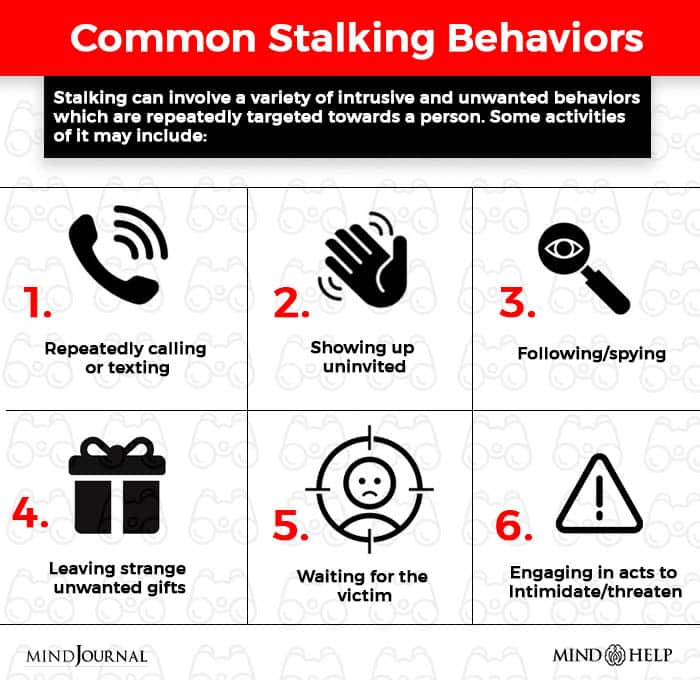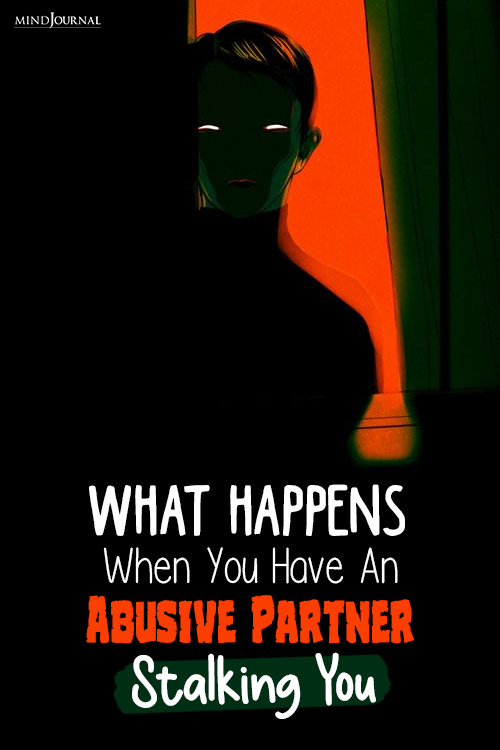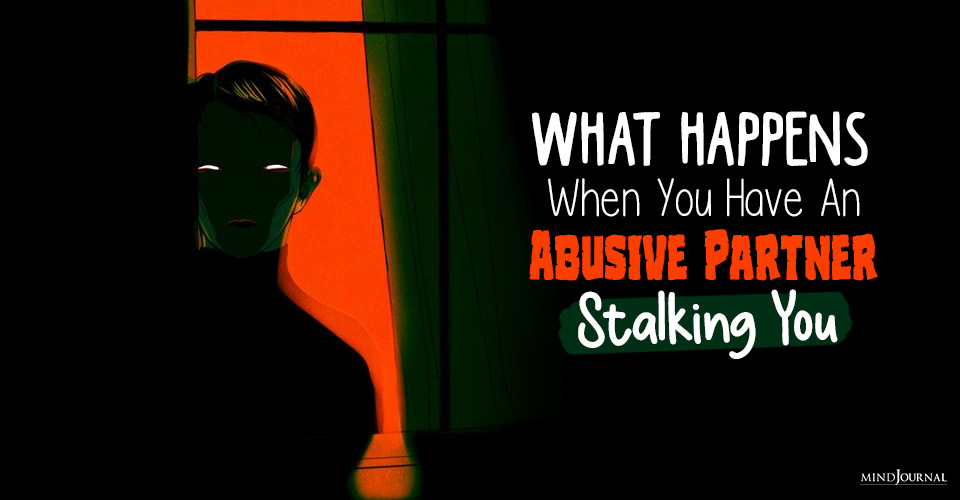Having an abusive partner stalking you is a scary and terrifying place to be, and there’s a reason why so many victims are deathly scared of even leaving their house if they have one. This post is going to talk about everything about stalking, what happens when you have an abusive partner stalking you, and how they get away with it.
When You Have An Abusive Partner Stalking You
Key Points
- Due to the largely non-physical nature of the behaviors, current laws may allow perpetrators to stalk with few repercussions.
- Preventing the predictable escalation of stalking behaviors may decrease the likelihood of violence towards stalking victims.
- When protection orders limit the proximity of perpetrators to their victims, stalkers may turn to other forms of harassment to assert control.
Think back to your first time learning about stalking. You probably imagined a creepy figure dressed in black following a young, pretty female down a dark alley, hat slipped down over his face just enough to prevent recognition. Today we know that stalkers come in all genders, ages, and locations. And more often than not, a stalker is a known person or former intimate partner of the victim.
Data from the Centers for Disease Control and Prevention (CDC) estimates 60.8% of females and 43.5% of males were stalked by a current or former intimate partner (Breiding 2014).
The stereotype that has not changed, however, is that we still seem powerless to stop many stalking behaviors. In cases of violence, a PFA (Protection From Abuse) order is sometimes granted, often limiting the number of yards or feet that a perpetrator is allowed to go within a certain address or location of the victim.
Related: The Dark Triad: How To Protect Yourself From The 3 Most Dangerous Personalities
Yet these PFA orders usually do not limit the perpetrators’ rights to continue to stalk and harass from across the street—or across the internet. So while they can no longer legally walk through your door or sit next to you at a café, they are still legally allowed to instill abuse in other areas; a constant reminder of who is in control.
When perpetrators can no longer use physical violence, they may turn to other forms of harassment and stalking to remind them who is in control.
As we plough through the digital age, stalkers have more tools than ever to stalk and harass their victims. Very few of us are exempt from having a digital footprint, and social media outlets eliminate even the smallest illusion of privacy. Even those of us without a Facebook account can still be ‘Googled’—your place of employment, address, and pictures visible to all. So what if you do everything you can to protect yourself, and they still find you?
At a certain point, hiding from a stalker can become obsessive, forcing the victim to constantly be looking over their shoulders, digitally and in person. Victims are told to delete their social media, stop frequenting the same places, and in some instances, to move. We continue to place the burden of responsibility on victims to stay safe, instead of holding stalkers accountable for their unsafe behaviors.
Stalking is more than a creepy nuisance. It is a pattern of obsessive and dangerous behavior that, if left unchecked, could do irreversible damage to another human being. Unfortunately, our legal system fails to see stalking as a pattern of behavior, and instead usually views each incident as a separate thing, making victims look petty or even paranoid.

Stalking follows a pattern of behavior that is predictable and preventable
Statistics show that stalking follows a pattern of behavior that escalates from obsession into violence, and that, “Stalkers who had a past intimate relationship with their victims were more likely to be at risk to commit violence,” with some researchers calculating that risk as high as 48% (Churcher 2013).
Yet we wait for stalkers to become violent and dangerous before we act, instead of preventing the inevitable violence that comes after a demonstrated pattern of behavior.
A study by the National Institute of Justice and the CDC carried out in 1998 found that “81% of women who were stalked by a current or former husband or cohabitating partner were also physically assaulted by that partner” (Carr 2020).
While that statistic largely ignores non-female identified victims of domestic violence, it sheds light on the large percentage of victims who were physically attacked after being stalked. They were attacked predictably.
Related: 4 Things Women Don’t Owe You
How can we predict stalking (and therefore prevent violence)?
While no warning label exists to identify who might be capable of stalking, a strong sense of entitlement, inability to handle rejection and persistent behaviors highlighting a lack of empathy may predict the potential for stalking.
Without empathy, a rejected ex-partner would have difficulty understanding when their obsession has gone too far. Without this voice of empathetic reason giving them pause to their behaviors, almost nothing can limit the lengths to which a person seeking vengeance might go.
Partners who have already demonstrated a lack of empathy regarding their harmful behavior during the relationship are more likely to turn to stalking when it ends because they are filled with anger and a need for revenge. But there is no foolproof way to tell, and sometimes victims do not realize they are in danger until they end the relationship, and by then it’s too late.
Despite major risks of stalking behavior, without defining all of its aspects as abuse and instituting mechanisms to mediate such non-physical tactics, we leave stalking victims unprotected until things get physical.
Related: Narcissists and Psychopaths Online: 3 Ways To Handle Cyberbullying and Trolls
If you are experiencing stalking or another form of domestic violence and feel unsafe, reach out to law enforcement, or the Domestic Violence Hotline at 1-800-799-SAFE.
Want to know more about how you can deal with an abusive partner stalking you? Check this video out below!
References:
Breiding, Matthew J., Sharon G. Smith, Kathleen C. Basile, Mikel L. Walters, Jieru Chen, Melissa T. Merrick. “Prevalence and Characteristics of Sexual Violence, Stalking, and Intimate Partner Violence Victimization--National Intimate Partner and Sexual Violence Curvey. United States. 2011.” Centers for Disease Control and Prevention. CDC Surveillance Summaries. Sept 5, 2014. Web. Accessed Dec 24, 2020. https://www.cdc.gov/mmwr/preview/mmwrhtml/ss6308a1.htm. Carr, Malique, and Scott Stewart. “Understanding and Countering Stalkers.” Torchstone Global. Jun 4, 2020. Web. Accessed Dec 12, 2020. https://www.torchstoneglobal.com/understanding-and-countering-stalkers/. Churcher, Frances P., and Marc Nesca. "Risk Factors for Violence in Stalking Perpetration: A Meta-Analysis." FWU Journal of Social Sciences. Winter 2013. Vol. 7, No. 2, 100-112. Breiding, Matthew J., Sharon G. Smith, Kathleen C. Basile, Mikel L. Walters, Jieru Chen, Melissa T. Merrick. “Prevalence and Characteristics of Sexual Violence, Stalking, and Intimate Partner Violence Victimization--National Intimate Partner and Sexual Violence Curvey. United States. 2011.” Centers for Disease Control and Prevention. CDC Surveillance Summaries. Sept 5, 2014. Web. Accessed Dec 24, 2020. https://www.cdc.gov/mmwr/preview/mmwrhtml/ss6308a1.htm.
Written By Kaytlyn Gillis Originally Appeared On Psychology Today









Leave a Reply
You must be logged in to post a comment.